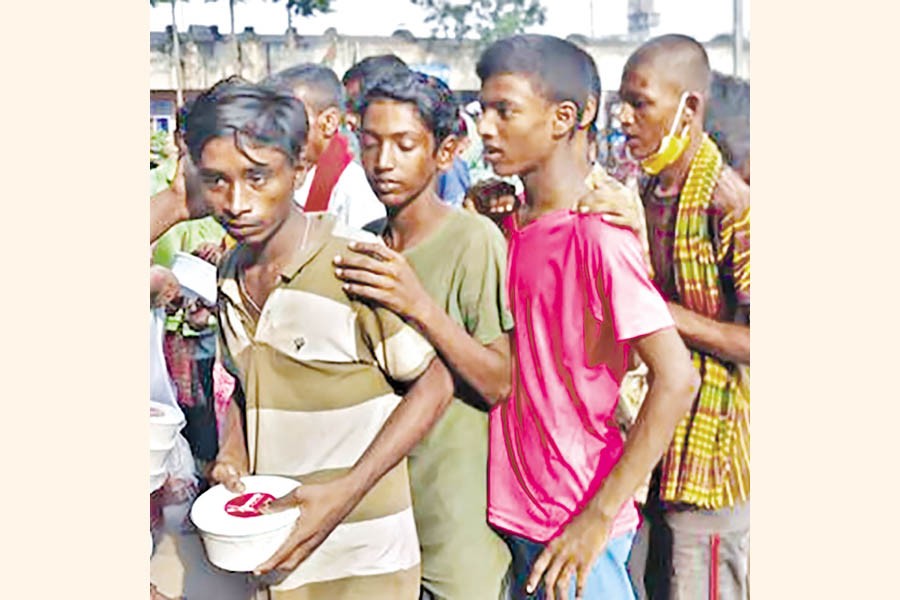
Published :
Updated :

Bangladesh's 37.8-per cent street children leave home due to poverty and hunger in their family, findings of a survey by the Bangladesh Bureau of Statistics (BBS) showed.
The interesting part of the survey is that 72 per cent street children do not want to go to rehabilitation centres due to absence of freedom.
Besides, the reunification chance with their family is also thin, as at least 36.3 per cent children do not have peace in their family, the survey found.
The national statistical body unveiled findings of the 'Survey on Street Children 2022' at its office in Dhaka on Monday.
Planning Minister M A Mannan was present as the chief guest of the programme, presided over by BBS Director General Md Matiur Rahman.
State Minister for Planning Dr Shamsul Alam, Statistics and Informatics Division Secretary Dr Shahnaz Arefin, UNICEF Country Representative Sheldon Yett, and BBS Director Mashud Alam spoke on the occasion.
The BBS survey found that 37.8 per cent street children left home due to poverty and hunger, 15.4 per cent for parents' migration to urban areas, 12.1 per cent for exploring work opportunities, 5.0 per cent for lack of custodian, and 3.6 per cent ran away from their home.
The BBS conducted the survey on April 04-23 last year, taking 7,200 samples across the country's eight divisions and two city corporations in Dhaka, BBS Director Mashud Alam said.
Among the street children, the BBS found that some 82 per cent were boys and 18 per cent were girls.
The number of street children was the highest in Dhaka South City Corporation (DSCC), 22.7 per cent, followed by Dhaka North City Corporation (DNCC), 18.3 per cent, the BBS survey noted.
As per the weighted average, Chittagong Division was the third highest home of street children with 17.5 per cent, Khulna Division had 8.1 per cent, Dhaka Division (except the two city corporations) 7.5 per cent, Rajshahi Division 7.3 per cent, Rangpur Division 5.5 per cent, Barishal Division 5.0 per cent, Mymensingh Division 4.1 per cent, and Sylhet Division 4.0 per cent.
As barriers of reunification with their families, 36.3 per cent street children identified absence of family peace, 21.3 per cent parents' unwillingness, 15.9 per cent absence of family formation, 11.9 per cent unfavourable family environment, 11.9 per cent non-compatibility to family, 11.4 per cent fear of torture/abuse, 11 per cent too much work, and 6.7 per cent social barriers, the BBS survey found.
Meanwhile, 72 per cent street children do not want to go to rehabilitation centres, while the remaining 28 per cent do want.
Among the major reasons behind their unwillingness to go to rehabilitation centres, 79.2 per cent street children described absence of enough freedom, 43.3 per cent disliked following rules and regulations there, 37.8 per cent felt that their own needs could not be met there, 34 per cent felt that they could not smoke there, and 31.9 per cent felt that they could not move with their friends freely from one place to another.
Some 66.8 per cent street children have plan to change their street life through better job/work, 27.9 per cent want to attend school, 27.2 per cent are unsure of type of work, 23 per cent want to try developing small businesses, 13.7 per cent want to return home, and 10.5 per cent have no specific plan, the BBS survey found.
Meanwhile, 92.1 per cent of the street boys are engaged with some activities, while 84.5 per cent street girls were occupied somewhere.
The BBS survey found that 78.7 per cent children suffer from fever, 41.4 per cent cough, 22.9 headache, 10.9 per cent waterborne diseases, 7.8 per cent skin diseases, 4.9 per cent intestinal diseases, and 3.7 per cent respiratory problems.
According to the BBS survey, among the street boys, some 28.8 per cent have the habit of smoking, and 13.7 per cent have drug addiction.
Among the girls, 4.6 per cent have the habit of smoking, and 4.4 per cent have drug addiction.
Meanwhile, the BBS survey has not provided any data on the total number of street children in the country.
The Bangladesh Institute of Development Studies (BIDS) survey showed that there were over 1.5 million street children in Bangladesh in 2015, suggesting that the number could rise to 1.6 million by 2024.
kabirhumayan10@gmail.com


 For all latest news, follow The Financial Express Google News channel.
For all latest news, follow The Financial Express Google News channel.